What the cool people sail
Solo round the world skipper in the 2000 and 2008 Vendee Globes, fully crewed monohull skipper in the 2005-6 Volvo Ocean Race, now for the last three years, Seb Josse has been turning himself into an ace trimaran pilot as skipper for the Edmond de Rothschild campaign (aka Gitana), backed by Baron Benjamin de Rothschild.
Having spent the first of his three years training on board the 77ft elongated ORMA 60 Gitana XI, Josse is now into his second season with the team’s MOD70 and this weekend scored his first real success, nailing Oman Air–Musandam to win the inaugural Route des Princes round Europe race. Racing alongside him was a crew including ex-Figaro sailor Thomas Rouxel and Olivier Douillard trimming, Cyril Dardashti and David Boileau grinding and ex-Orange maxi cat crewman Florent Chastel on the bow, plus Charles Caudrelier navigating and monitoring performance, America's Cup helmsman and match racer Sébastien Col calling tactics for the inshores, and ex-ORMA 60 skipper Antoine Koch and ex-Tornado sailor Jean-Christophe Mourniac, the only one to have made the transition from the Groupe Edmond de Rothschild Extreme 40.
So is Josse a signed-up multihull sailor now? “Slowly. I am starting to become one. This year I feel more confident in this type of boat so we’ve been pushing up the level.”
While the last three years have seen him get into multihull racing full time, he had previously sailed a little on the ORMA 60 trimarans, the more flighty predecessors to the MOD70s. Despite the unfortunate capsize of Spindrift in Dun Loaghaire, he believes the MOD70s to be much safer. “We have never made a big nose dive on these boats so far [touch wood]. Last year we tried to find the limit. When we started the transat [Krys Ocean Race between New York and Brest] we didn’t know which sail combination we should put up and the angles. Everyone was discovering the boats and no one wanted to suffer any big damage or have big nose dives, so we were holding back a bit. Now we are much more confident in all the conditions - sea state or wind - and we feel safe. We are definitely pushing harder this year.”
And the performance of the MOD70s has taken a hike as a result too. During the first major event ever for the MOD70s, the Krys Ocean Race, the top 24 hour run recorded was 711 miles. But that was then. During training this season Josse says that they have touched 38-39 knots, while during the ArMen Race this spring Edmond de Rothschild averaged 33 knots for one hour (which translates to a 792 mile day).
“So we are sailing the boats better and we are pushing them harder. The boats have the potential to do big runs. Provided you have flat water and 20-25 knots, you can go really fast. The problem is the sea state. The flatter it is, the faster it is and the safer,” says Josse.
Post Route des Princes victory, Edmond de Rothschild now returns to her base in Brittany where she will get a refit. Fortunately Gitana has a large shore team –19 people including the sailors. “We just have to put the boat on the dock and give it to them. But the problem is to get it back off them!” quips Josse.
While the boat is a one design, some pampering is allowed. About the only significant change this year is that all the MOD70s will be getting new foils in her floats prior to the Transat Jacques Vabre. In terms of sails, they are all one-design too. In fact on Edmond de Rothschild, the taffeta-covered 3Di mainsail they used in the Route des Princes is the same one as they had on board last year. “You can choose to change it or not," says Josse. "You can buy three sets of sails. Some boats have only got two because they came later, but we didn’t choose to change all of the sails because they are quite strong on this boat. Now we just have a new jib and new genniker. The mainsail is fine.”
In terms of their race schedule from here, Edmond de Rothschild will compete in the Artemis Challenge, around the Isle of Wight during Cowes Week and then the Rolex Fastnet Race. During 2011 Fastnet, Josse and the crew of Gitana XI came home on the heels of Banque Populaire, despite their trimaran being just over half the size of the mighty Banque Pop. At present they are entered this year's race on Gitana XI again, but Josse thinks that they might take the MOD70 instead. This will depend on what is found when they've got the boat back to their base (a decision will be made this week).
Post-Fastnet it will be all guns blazing in their preparation for the Transat Jacques Vabre which Josse is sailing with former Groupama 70 navigator and Solitaire du Figaro winner, Charles Caudrelier.
Prior to the start of the Route des Princes, Josse and Caudrelier had done two weeks of two handed training together.
It should be pointed out that the MOD70s are designed to be sailed by a full crew (ie six to eight), however it is hard to imagine that anyone even from the outset in France truly believed that they wouldn’t be racing them in major offshore events such as the Transat Jacques Vabre and the Route du Rhum.
As Josse puts it: “Last year no one wanted to sail these boats doublehanded, but when we saw there was no program this year we all looked at each other and said ‘ perhaps we can do TJV’, because if we don’t do that we won’t be doing anything. The issue will be how we manage to this type of boat doublehanded. To go to Brazil is not the big deal. The question is how fast?”
Some mods will have to be made to the boats to make them easier to sail shorthanded. While there have been threats of taking the MOD70s out of class, according to Josse there is some accord between the teams as to what extent this will take. So while the winch set-up won’t be altered for example, jammers might be added etc. “It is too complicated to do more and the time is too short, and afterwards you would have to put the boat back into class. We will be putting some stuff on – but nothing major.” The MOD70s were fitted with autopilots as a part of their original fit-out.
As to how the three-hulled beast is to sail shorthanded, Josse says: “For all of the manoeuvres it is okay. When the sails are up it is not so hard to tack and gybe. After that the big thing is to go fast. When there is not so much wind it is easy, but when you have to keep going at 32-35 knots singlehanded (because the other crew is sleeping) it isn’t going to be so easy in the head. Physically it is not a big problem, but mentally you have to remain really really focussed and the thing that we don’t know today is how to manage that when we are tired.”
The format for the Transat Jacques Vabre has yet to be announced. In previous years when the event ended up in Salvador de Bahia in Brazil the multihulls had to leave Ascension Island to starboard while the monohulls sailed the direct course, so that the arrival times across the different classes and genres/sizes of boats in the race would be more compressed. This year the course is even longer – it is finishing in Itajai in the south of Brazil - and there is talk that the course might include a stopover for the faster multihulls. Personally we think a Transpac-style staggered start/pursuit race format is the way to go.
For everyone involved in the MOD 70 at present the question remains – what is the future for the class? Of the events this year, including the two major ones, the Route des Princes and the Transat Jacques Vabre, none have been organised by the MOD class who originally had a round the world race pencilled in for their fleet for 2013.
Josse says that his ideal scenario is to see a fleet of six to eight MOD70 racing regularly. “Seven boats on the start line would be a nice fleet, but today it is not easy to find the budget for that.”
And truly, with 20-30 years of ORMA 60 development behind them, the MODs deserve to succeed. Aside from some issues with the foils in the floats (which are due to be replaced before the Transat Jacques Vabre) the boats have proved to be extremely reliable and, as anyone who witnessed the racing in the Route des Princes will attest, the crews are now pushing the ^%$^%$ off them.
MOD70s are also extremely versatile. While you wouldn’t want to take one around the world on a classic headbanger Southern Ocean route, part of their original design brief was that they be able to race around the world ‘the pretty way’ via the Suez and Panama canals. But given that the one design rules don’t allow crews to optimise their boats for inshores (one of the downfalls of the ORMA 60s), they are equally well suited for this, as they are for coastal or hardcore offshore racing.
“This boat can do everything,” Josse confirms. “Maybe around the world - we have to think about that, because the life on board is not so easy... maybe if it is in legs and we take care about the weather. Downwind, it is fine, in 40-45 knots, you are not racing, but it is okay. But upwind in 40 knots in this type of boat – it is not possible, the boat is not made for that.” Although that is probably also true of most other high performance race boats (remember the VO70s en route to Qingdao in 2008-9).
Josse says he is sorry the MOD round the world race didn’t occur this year. “Everyone who bought into this class wants to do that race. It was the goal from the start for Virbac, for us, Spindrift, etc. I hope that will happen, but I’m not sure. We will see – last winter we didn’t know where we were going this year. This year we have two good races (the Route des Princes and the TJV) and some smaller races. But we’ll have to wait until next winter to know what’s happening in 2014. I know people are working on that.”
One of the significant issues will be whether or not the boats compete in next year’s Route du Rhum. Josse reckons this will come down to how well they get on racing the boats doublehanded in the Transat Jacques Vabre this autumn. “Doublehanded is like sailing singlehanded ultimately. If we manage to complete the Transat Jacques Vabre with no problems and no damage in I’m sure people will say we can sail these singlehanded.”
While for some reason there is no ‘Ultimate’ class in the Transat Jacques Vabre this autumn, there is one planned for the Route du Rhum, so given that even the speedy MOD70s are likely to be uncompetitive against Francis Joyon’s substantially longer IDEC, plus the 2010 winner Groupama 3 (now Banque Populaire) and Thomas Coville’s new Sodebo, it will require that the MOD70s race in their own class.
At present Josse may be in the enviable position of being able to concentrate on multihulls, he still keeps an eye on both the IMOCA class and the Volvo Ocean Race. “If one day I have the opportunity to go back into the IMOCA class and do a campaign like BT again, for sure I’ll do it - I am very motivated to do that,” he says.
He feels the same way about the Volvo. Having skippered ABN AMRO Two, in the 2005-6 race, he’d like to return, but this time with a properly competitive campaign. “I like offshore racing - singlehanded, doublehanded or fully crewed and now multihull or monohull. As long as you have a good team, I am happy to do it. Volvo, especially now with one design, it is quite nice, as it should open some doors to other teams.”
At one point Josse was a keen Moth sailor. He admits he has sold his Bladerider but wants to buy a new one, a Mach 2.2. “But I need some money, because it starts to be expensive and I already have some big toys - two big trimarans.”
Money? But you’re a skipper of a MOD 70?! “This is France. It is not like England. I don’t have a Porsche!”

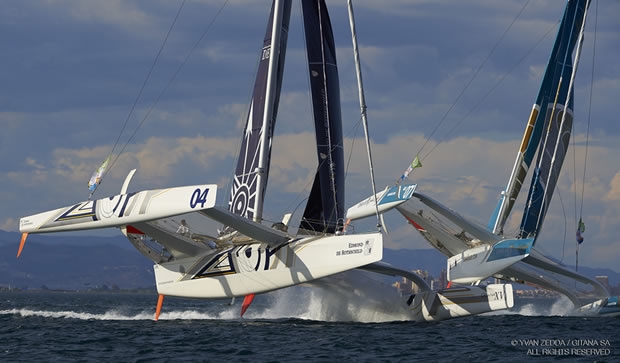
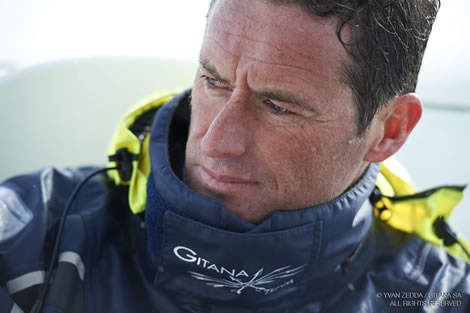
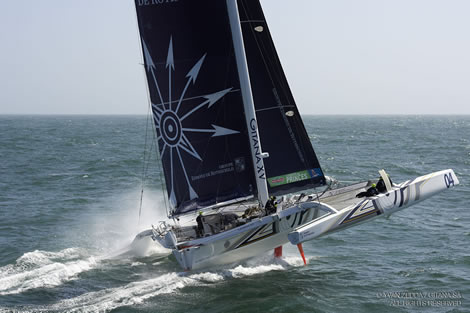
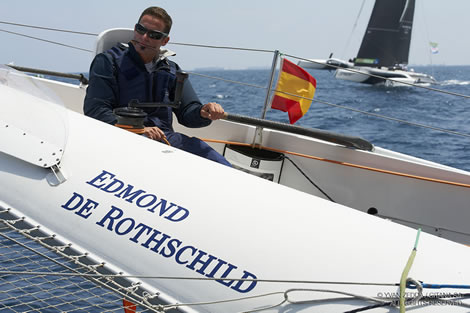
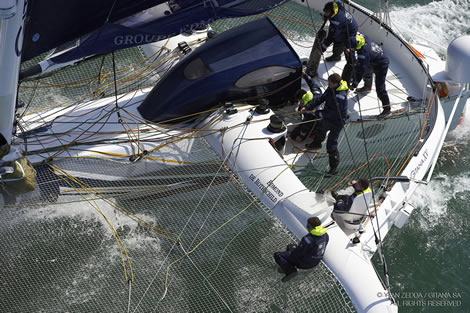
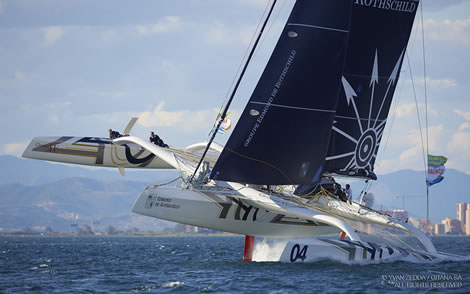








Latest Comments
wizdeas 03/07/2013 - 18:50
Nice final comment - no Porsche - he's a proper sailor!Add a comment - Members log in